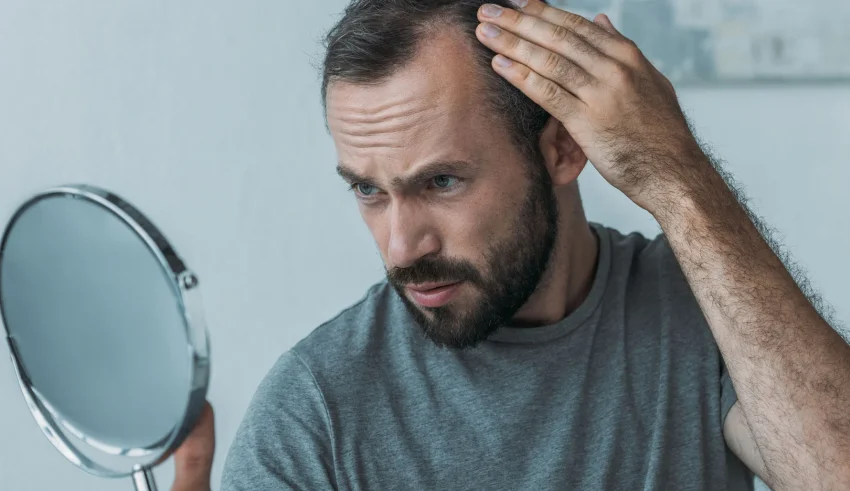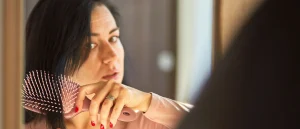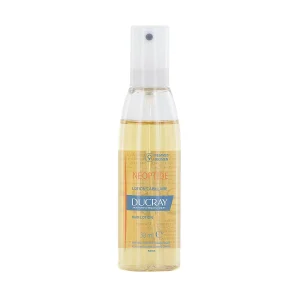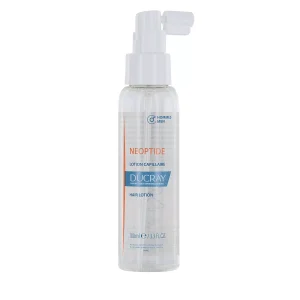
It is normal to lose a certain amount of hair each day. If more hair is falling out than usual, it can be a source of distress and concern. While male and female pattern baldness are the main causes of hair loss, there are other causes as well. A doctor will want to explore these before recommending the appropriate treatment. In this article from The Dermo Lab and in collaboration with the dermatologist Dr. Mustafa Marai, we’ll look at the main reasons for hair loss, the treatments available, and tips for preventing further hair loss.
What are the main reasons for hair loss?
According to Dr. Mustafa Marai, you should be concerned about this problem if your hair loss is greater than 150 hair follicles per day or if you feel that your hair density is becoming increasingly thin.
The possible reasons for hair loss are listed below:
- Androgenetic alopecia
Androgenetic alopecia is another term for male or female baldness. It is a very common cause of hair loss.
Male and female baldness is genetic. Men tend to lose their hair at the temples and crown of the head. In women, hair generally becomes thinner all over the head.
Androgenetic alopecia is most likely to occur with age, but it can occur at any time after puberty. Many women who suffer from androgenetic alopecia develop it after menopause. This means that hormones may have something to do with it.
- Pregnancy
Some women may experience excessive hair loss shortly after giving birth. This is due to a decrease in estrogen levels. This type of hair loss is temporary and usually resolves within a year or less.
- Telogen effluvium
Telogen effluvium is a condition in which the hair remains in the telogen (natural shedding) phase of the growth cycle. This results in increased hair loss, sometimes in handfuls.
Telogen effluvium is usually a temporary condition that resolves over time. It is advisable to consult a physician to determine the cause.
Here are some possible causes:
- Severe stress
- Surgery
- Childbirth
- Rapid weight loss
- Thyroid problems
- Certain medications
A doctor will need to treat any underlying causes of telogen effluvium.
- Anagen effluvium
Anagen effluvium is the rapid loss of a large amount of hair during the anagen (growth) phase of the hair cycle.
This condition can result in hair loss on the head, but also on other parts of the body, including the eyebrows and eyelashes.
The causes of anagen effluvium are:
- Chemotherapy
- Radiation therapy
- Fungal infections
- Autoimmune diseases
- Alopecia areata
Alopecia areata is an autoimmune disease that causes sudden hair loss. The immune system attacks the hair follicles, as well as other healthy parts of the body.
Hair on the scalp, as well as eyebrows and eyelashes, may fall out in small pieces.
- Traction alopecia
Traction alopecia is hair loss caused by pulling hair into tight hairstyles, causing it to break and fall out. Hairstyles associated with this condition include:
- Tight buns or ponytails
- Braids
- Extensions
If traction alopecia continues, the person may develop bald spots and thinning hair.
- Medications
Some medications have side effects that can cause hair loss.
Examples of these medications include:
- Blood thinners, such as warfarin
- Accutane, to treat acne
- Antidepressants, such as Prozac and Zoloft
- Beta-blockers
- Cholesterol-lowering drugs, such as Lopid
If a person thinks that hair loss may be due to a medication they are taking, they should consider seeing a doctor for an evaluation. The doctor may be able to reduce the dose or change the medication.
- Nutritional deficiencies
Nutritional deficiencies can lead to hair loss. Extreme diets that are too low in protein and certain vitamins, such as iron, can sometimes cause excessive hair loss.
- Birth control pills
People who take birth control pills can lose their hair. Others may lose their hair several weeks or months after they stop taking them.
Other forms of birth control that act on hormones, such as contraceptive patches and implants, can also cause hair loss.
- Ringworm
Ringworm is a fungal infection that can cause hair loss. Ringworm of the scalp, or tinea capitis, can cause temporary baldness on the head.
What are some ways to stop hair loss?
Hair loss not only affects your appearance, but it can also cause emotional stress and affect your confidence. There are several things you can do to help reduce hair loss:
1- Wash your hair with an anti- hair loss shampoo
Keeping your scalp clean and healthy is essential to achieving fuller hair. Anti-hair loss shampoos strengthen the structure of the hair strand to prevent breakage and splitting.
Anti-hair loss shampoos contain ingredients that can help prevent hair loss and encourage hair growth. They may also contain ingredients that improve the overall health of a person’s hair.
Take the stress out of finding the best shampoo for your fine hair with our expert-approved anti-hair loss shampoo.
Ducray Anaphase + Anti-Hair Loss Complement Shampoo
2- Apply a lotion for hair loss
Factors such as stress, pregnancy, or certain medications are often the cause of occasional hair loss. To slow down or prevent occasional hair loss in such circumstances, the following lotion is exactly what you need! Right from the first application, your hair will regain strength, vitality, and volume.
Ducray Creastim Anti-Hair Loss Lotion
If you suffer from chronic hair loss due to hormonal or medical problems, we recommend using Neoptide Anti-Hair Loss Lotion which prevents hair loss and promotes hair growth. It is perfect for daily use thanks to its light formula and non-greasy texture. Ducray has launched two types of Neoptide Lotion: one for women and one for men.
Ducray Neoptide Anti-Hair Loss Lotion for Women
Ducray Neoptide Anti-Hair Loss Lotion for Men
Self-care
To prevent hair loss, it is recommended to:
- Avoid tight hairstyles that can affect the hair.
- Avoid aggressive hair treatments such as heat tools, hair dyes, and bleaches that can damage hair.
- Keep your scalp healthy by washing your hair and scalp regularly.
- Take vitamins. Your doctor may run various tests to check for vitamin deficiencies. Some vitamins and minerals such as vitamins A, B, C, D, E, zinc, and iron can affect hair growth. Supplements help maintain healthy hair.
Dr. Mustafa Marai states that the following steps can also help reduce hair loss:
- Having a nutritious diet rich in vitamins, proteins, and minerals.
- Getting a good night’s sleep.
- Exercising.
- Avoiding mental stress.
FAQ about the reasons for hair loss
Can Botox cause hair loss?
Dr. Mustafa Marai explains that Botox injections into the scalp can be a short-term solution for frizzy or oily hair. It can cause skin irritation, allergies and dry out your hair. So, while it relaxes your hair to make it more manageable, it is more damaging to the health of your hair.
Does showering every day cause hair loss?
Dr. Mustafa Marai says that daily showering does not cause hair loss.
Do headbands cause hair loss?
Dr. Mustafa Marai points out that headbands can cause hair loss by pulling hair. Headbands and turbans are tighter than an average hat and therefore can cause traction alopecia. He adds that the permanent tension causes inflammation and can gradually lead to permanent hair loss.
Does covering your hair cause hair loss?
It is unlikely that covering your head will have any effect on your hair loss or diminish the effects of treatment.
Can dehydration cause hair loss?
Dr. Mustafa Marai notes that dehydration can cause very dry, rough hair that can easily break and fall out.
Get help now
It’s normal for a certain amount of hair to fall out each day. If a person notices that they are losing more hair than usual, they may have an underlying condition. In this case, they should consult a doctor and seek advice on the best treatment options.
In many cases, the hair returns to its normal state once the doctor has treated the underlying condition.
Don’t wait. The sooner you address the symptoms of hair loss, the better your chances of avoiding irreversible damage. Consult a health care professional today to begin your journey to fuller hair.













